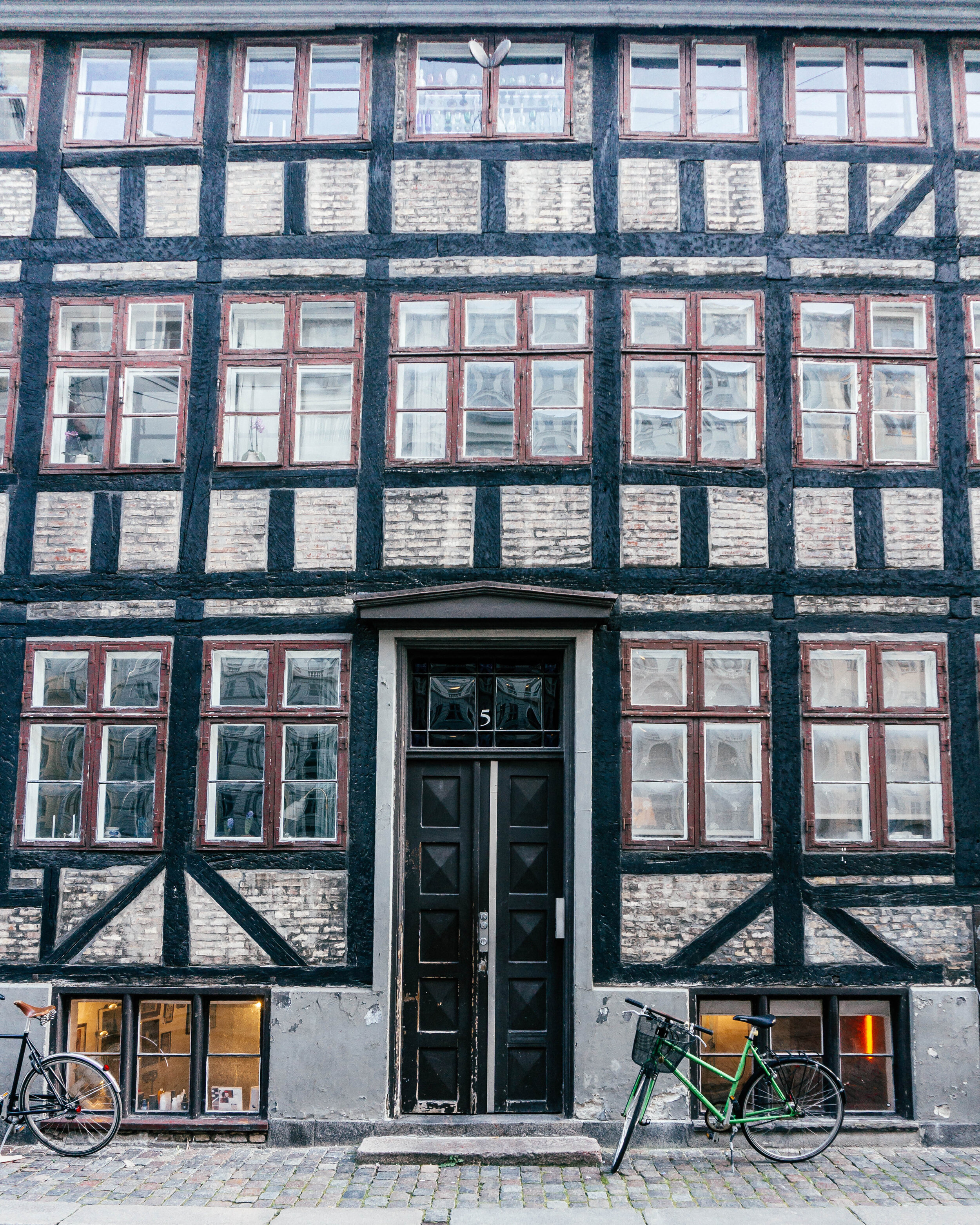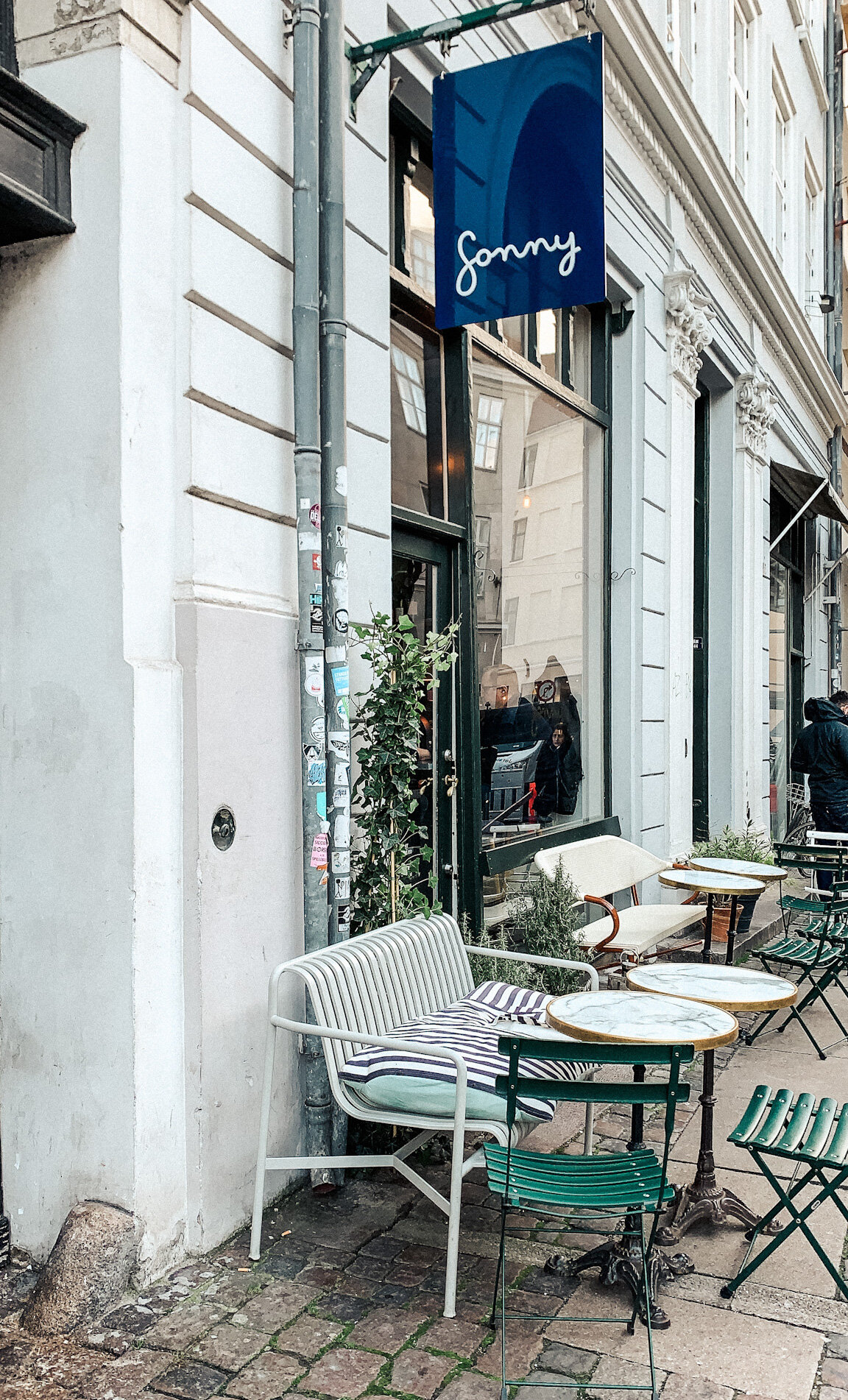As you wander the streets and explore Copenhagen, you’ll get an inside look into the customs that shape the happiest people in the world. With clean design, minimalistic fashion and an advanced approach to work-life balance, it’s no wonder the “Hygge” lifestyle is becoming increasingly popular all over the world. When you return from Copenhagen, you’ll be ready to throw out half your closet, light some candles and cozy up with a good book by the fireplace.
WHERE WE STAYED:
Hotel SP34: SP34 is a modern, hip hotel located right in the midst of Copenhagen’s restaurants, shops, and cafes. The fireplace lounge in the lobby epitomizes Danish hygge. Two of my favorite features of the hotel were the Ren skincare products and the heated floor in the bathroom.
WHAT WE DID:
Magstræde: One of the oldest streets in the old town of Copenhagen. The small lane exudes historic charm and character with its bend at one end, old cobblestone paving stones, and lovely buildings. It is narrow enough to imagine old wagons bouncing over the stones on their way down to the docks.
Nyhavn: It is nearly impossible Copenhagen without a stroll along Nyhavn. The historic bright, colorful houses have been renovated and restaurants line each side of the old port. You cannot miss one of the most iconic street views in all of Scandinavia.
Rundetaarn: The round tower is a 17th-century tower located in central Copenhagen which was built as an astronomical observatory. You can stroll up the spiral walkway to enjoy the magnificent view old Copenhagen.
Botanical Gardens: Copenhagen Botanical Garden is located in the center of the city and has 27 historical glasshouses dating from 1874. The Palm House, the most notable glasshouse, is 16 meters tall and has narrow spiral staircases leading to a passageway at the top. Some of the plants there are more than 100 years old.
Freetown Christiana: Christiania is, according to Visit Copenhagen, an "alternative hippie society". It is open to the public and incredibly interesting to explore. All of Christiania is completely green, car-free, and the people there follow their own set of rules completely independent of the Danish government. This alternative neighborhood offers music venues, homemade houses, workshops, art galleries, and countless eateries!
WHERE WE ATE:
Atelier September: I now understand why this place appears so many times through Instagram. The space is to die for and if I could, I would have had brought all the posters of Matisse with me. I ordered a latte with oat milk and an avocado toast which was great. FYI, they do not have any bathrooms (we learned this the hard way).
Mad & Kaffe : This local favorite serves delicious - and photogenic – breakfast that has everyone lining up for their food. Grab a menu and pick from a variety of small dishes to make up your breakfast or lunch board.
Sonny: Sonny coffee shop is one those place where you walk in for coffee but stay for the food. Their stylish crowd, hip décor, and delicious lunch special, will have you coming back for more. We both ordered the lunch special and it was by far one of our favorite meals of the trip.
Andersen & Maillard: In need of coffee and pastry, check out Andersen & Maillard. Known for its excellent coffee and mouthwatering croissants, coffee snobs won’t be disappointed here. It also offers a cozy atmosphere for those looking for more than just great coffee sip.
Kompa'9 : offers organic coffee, delicious food, and cozy atmosphere – perfect if you need to catch up on work or reading in a family room setting. They also have a wood-burning stove! It can’t get cozier than that. The barista was so friendly and joked with us about how the word cider is used in America vs. the rest of Scandinavia.
Gao Dumplings: A casual restaurant bridging Chinese street culture with Scandinavian simplicity. This was a great inexpensive and delicious dinner. Our favorite was the spicy pork!
Slurp Ramen Joint: This place has quickly become a local hot spot. We showed up for an early dinner and had to wait outside for about 20 minutes because the line was out the door! The space is small and there is only bar seating, but that’s all part of the charm. The menu is even smaller, covering only three classics: shio, shoyu, and veggie ramen. Be warned that this was an expensive bowl of ramen for what we are used to.
Torvehallerne KBH: Urban, covered marketplace featuring stalls with local produce, gourmet foods, beverages & desserts. A great place to pick up some local specialties or grab a quick bite for lunch.
TIPS:
Being considered the most bike friendly city in the World, it’s obvious that bicycles will be seen everywhere. However, it’s very walk-able and you easily reach a large part of the city
Prior to your visit to Copenhagen, you may expect to be greeted by locals with toothy grins and echoing laughter. They are the happiest people in the world, after all. I was quite surprised by their stark demeanor and muted expressions. The locals have a very dry sense of humor, and while most speak impeccable English, you may find it difficult to strike up a conversation. Don’t mistake this for rudeness. Small talk isn’t as common in Scandinavian countries, and in their culture, short and to the point answers or directions is a polite way to respond.
Expect to burn a hole in your wallet. You will need to budget accordingly before heading to Copenhagen. It’s an expensive city, especially for foreigners dealing with a weaker dollar.
The streets in Copenhagen are immaculate. The tax rates are extremely high in Denmark, but locals consider this a reasonable price to pay for living in a clean, well-run city that offers a plethora of benefits for their home and work life.


































